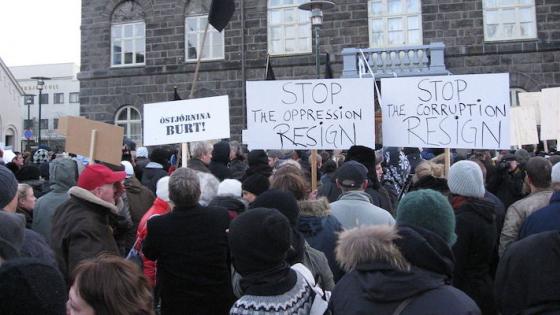
Reversing the retreat of democracy: The case of Iceland
Thorvaldur Gylfason discusses the decay of social capital in Iceland
Search the site

Thorvaldur Gylfason discusses the decay of social capital in Iceland
In recent decades, the decay of social capital in its several manifestations has become a serious, evidence-based concern, brilliantly captured by Robert Putnam ́s book title, Bowling Alone (2000). Signs of declining trust, increased inequality, stunted life expectancies, corruption on the rise, and democracy in retreat are evident in an increasing number of countries (e.g. Dustmann et al. 2017). The consequences are troubling, especially perhaps in the US. According to Gallup (2019), the proportion of its American respondents expressing confidence in Congress dropped from 35% in 1988 to 11% in 2019. Transparency International (2019) lowered the corruption perceptions index for the US from 78 in 2000 to 69 in 2019, well below Canada whose score is 77. Further, Freedom House (2019) lowered the democracy score of the US from 94 in 2010 to 86 in 2019 compared with Canada’s score of 99 and Poland’s 84 in 2019.
By the above measures, the US now trails not only Canada but also an increasing number of European states as evidenced by a string of striking titles published by American academics, including Page and Gilens´s Democracy in America? (2017), Levitsky and Ziblatt´s How Democracies Die (2018), Mounk´s People vs. Democracy (2018), Snyder´s Road to Unfreedom(2018), and Diamond´s Ill Winds: Saving Democracy from Russian Rage, Chinese Ambition, and American Complacency (2019). The decay of social capital can be contagious. Misbehaviour by elites in the US provides cover for comparable misconduct in other countries such as US NATO partners Hungary, Poland, Turkey as well as Brazil, India, and others, undermining social capital also there. We live in a changing world.
Iceland, my beloved native country, is a less well-known case of social capital decay. This is partly because some of the available information on social capital in Iceland is imperfect (Gylfason 2019). The Economist Intelligence Unit´s democracy index for 2019 is a case in point. The index assigns Iceland a democracy score second only to that of Norway in a group of 165 countries. The EIU report grants Iceland a top score of 10 for political culture but fails to note that the Icelandic parliament resolved unanimously in 2010 that “criticism of Iceland‘s political culture must be taken seriously and [Parliament] stresses the need for lessons to be learned from it” [my translation]. Parliament resolved in 2012, less than a year before the ten-year statute of limitations was to take effect, to investigate alleged violations of the law in connection with the privatisation of the banks during 1998-2003, but it failed to implement its own resolution. Expressing no interest in finding out what went wrong in the first round of privatisation that resulted in a crash a few years later followed by renationalisation, the government nevertheless has announced its plan for a new round of bank privatisation.
All things considered, Iceland’s political culture remains essentially unchanged. This is witnessed also by the fact that the new post-crash constitution, approved by 67% of the voters in a 2012 national referendum called by parliament, remains to be ratified by parliament, which remains beholden to local fishing vessel-owning oligarchs whose bribes to Namibian ministers recently landed the latter in jail. The government continues to grant these oligarchs about 90% of the sizable resource rent from the fisheries each year. Consequently, the oligarchs and their political clients in parliament object, in particular, to the constitutional provision that declares that “Iceland’s natural resources which are not in private ownership are the common and perpetual property of the nation. […] On the basis of law, government authorities may grant permits for the use or utilization of resources or other limited public goods against full consideration.” This provision was approved by 83% of the voters in 2012.
Nor does the EIU report note that, in 2016, some 600 Icelanders, including the prime minister, the finance minister, and the minister of justice, were exposed in the Panama Papers, another clear indication of Iceland’s flawed political culture. Ever since he exposed the former Prime Minister on television in 2016, leading to the latter’s abrupt resignation, the sole Icelandic Pulitzer Prize-winning journalist has been unable to find employment in broadcasting in Iceland.
Like the US, Iceland shows several signs of social capital decay.
Nevertheless, Iceland’s long-term prospects seem bright to me. My optimism presumes that parliament will respect the will of the people by ratifying the new constitution, which is designed to reverse the retreat of Iceland’s age-old democracy, rein in corruption, and restore social trust. Although ratification is overdue, it is never too late to do the right thing. Should parliament fail to ratify the new constitution, Iceland may become further enmeshed in the emerging cluster of countries where democracy is now under the greatest stress. The people of Iceland must reverse this trend.
Diamond, L (2019), Ill Winds: Saving Democracy from Russian Rage, Chinese Ambition, and American Complacency, Penguin Press.
Dustmann, C, B Eichengreen, S Otten, A Sapir, G Tabellini and G Zoega (2017), Europe's Trust Deficit: Causes and Remedies, Monitoring International Integration 1, CEPR Press.
Gylfason, T (2015), “Social Capital, Inequality, and Economic Crisis.” Challenge, July.
Gylfason, T (2019), “Ten Years After: Iceland´s Unfinished Business”, in R Z Aliber and G Zoega (eds), The 2008 Global Financial Crisis in Retrospect, Palgrave.
Levitsky, S, and D Ziblatt (2018), How Democracies Die, Crown.
Mounk, Y (2018), The People V. Democracy: Why Our Freedom Is in Danger & How to Save It,Harvard University Press.
Page, B I and M Gilens (2017), Democracy in America? What Has Gone Wrong and What We Can Do About It, University of Chicago Press.
Putnam, R D (2000), Bowling Alone, Simon and Schuster.
Snyder, T (2018), The Road to Unfreedom: Russia, Europe, America, Tim Duggan Books, Crown, Penguin Random House.